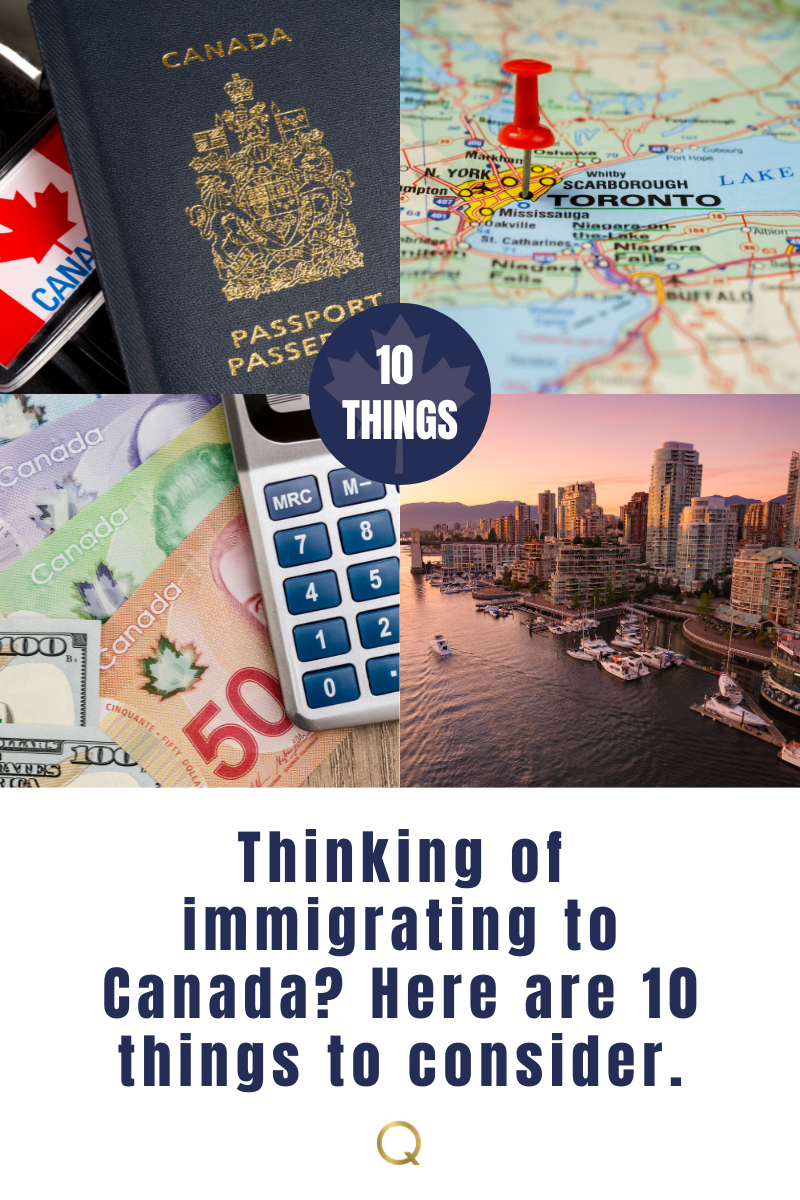The decision to move to a new country is a big one, so it’s important to consider all the factors before making the move.
Are you considering immigrating to Canada? The decision to move to a new country is a big one, so it’s important to consider all the factors before making the move. Here are ten tips to help you prepare for your move and ensure a successful transition to Canada. Whether you are immigrating for work or family reasons, these tips will help you navigate the process and provide insight into what life in Canada is like. Read on for some helpful advice to get you started on your journey to a new life in Canada!
1) Understanding the immigration process in Canada
Canada has become a popular destination for immigrants, offering opportunities for a better quality of life, career growth, and excellent healthcare services. The process of Canadian immigration is an intricate and multi-step procedure that involves several stages.
The Canadian government welcomes skilled workers, entrepreneurs, investors, students, and family members to come and settle in Canada. However, before starting the application process, it is essential to understand the immigration process in Canada thoroughly. Having that initial consultation with Quadro Law is a great way to determine your eligibility to immigrate to Canada. You will need to fulfill specific criteria and provide evidence of your education, language proficiency, work experience, and financial stability.
There are several types of visas and immigration programs available, such as the Federal Skilled Worker Program, Canadian Experience Class, Provincial Nominee Program, and Family Sponsorship. Each program has its requirements, processing times, legal fees and application fees.
The next step is submitting your application, along with the required documents and fees. Your application will then be reviewed by the Immigration, Refugees and Citizenship Canada, who will assess your profile, conduct background checks, and determine whether you meet the requirements for admission.
Once you become a permanent resident, you can enjoy many benefits, such as access to healthcare services, free education for children, and the ability to apply for Canadian citizenship after a certain period.
In summary, understanding the process of Canadian Immigration is critical to avoid unnecessary delays and complications. It is essential to gather information about the eligibility criteria, immigration programs, required documents, fees, and processing times before starting your application.
2) Knowing your eligibility to immigrate
Before deciding to immigrate to Canada, it’s important to know whether you meet the immigration eligibility requirements. There are different requirements for different immigration programs, such as skilled worker programs, family sponsorship, and business immigration.
For example, the Federal Skilled Worker Program requires candidates to have at least one year of skilled work experience in a qualifying occupation, meet the language proficiency requirements in either English or French, and minimum points on the selection factors assessment.
To find out if you meet the eligibility criteria for Express Entry, you can use the free online eligibility tool on Quadro Law’s website. This tool asks a series of questions about your age, education, language proficiency, work experience, and other factors.
Keep in mind that meeting the eligibility criteria doesn’t guarantee that you’ll be approved for a visa. Other factors can affect your application, such as criminal inadmissibility, medical inadmissibility, or misrepresentation.
If you have concerns about your eligibility or need help with the application process, it’s highly recommended that you consult with an immigration lawyer. At Quadro Law we can assess your situation, provide advice, and help you navigate the complex immigration system.
3) Types of visas and immigration programs available
If you’re considering immigrating to Canada, it’s important to understand your options. The most popular program is the Express Entry program, which allows skilled workers to immigrate to Canada. The process involves a points system based on education, work experience, age, and language proficiency.
For those who have family members already living in Canada, the family Immigration program may be an option. This program allows Canadian citizens and permanent residents to sponsor certain relatives to come to Canada and live with them.
There are also specific programs for students who want to study in Canada. Student visas are available for those who have been accepted to a Canadian school and can lead to opportunities for permanent residency after graduation.
If you have parents or grandparents wanting to visit Canada, the super visa may be an option for you. This program allows parents and grandparents to come to Canada and stay with their family members for up to five years per visit.
It’s important to research the different types of Canadian immigration and determine which program is the best fit for you. Consider factors such as your education, work experience, and family ties to Canada.
Having a lawyer determine the best option for you at the time is a valuable use of time, effort and cost.
4) Finding a job and work permits
If you are planning to come to Canada before you become a permanent resident, then obtaining a work permit may be essential. It is important to research the job market in your field and identify potential employers. This can be done through online job postings, networking with colleagues in your field, and contacting recruitment agencies.
To obtain a work permit in Canada, you must often have a job offer from a Canadian employer. The employer may need to provide you with a Labour Market Impact Assessment (LMIA), which confirms that there are no Canadian citizens or permanent residents who can fill the position.
It is important to note that some professions may require additional qualifications or certifications in order to work in Canada. Before applying for a job in your field, you may need to obtain Canadian credentials or certification. This process can be lengthy, so it is important to begin the process as early as possible. Additionally, if you plan to start your own business in Canada, there are several immigration programs available that can help you obtain a work permit. The Start-Up Visa program, for example, is designed for entrepreneurs who wish to start a business in Canada.
Depending on your immigration plan, finding a job and obtaining a work permit may be an essential step in the immigration process. By doing your research and planning ahead, you can increase your chances of finding a job in Canada and successfully obtaining a work permit.
Related to this topic, watch for immigration scams. One common scam will involve a consultant asking you to pay them for a job offer. Applicants have paid thousands of dollars to third parties, only to find that there is no real job awaiting them. Even worse, if Immigration, Refugees and Citizenship Canada discovers the deception, the applicant will be barred from entering Canada for five years. As the old saying goes, “If it sounds too good to be true, it probably is”.
5) Cost of living and financial requirements
One of the most important things to keep in mind when immigrating to Canada is the cost of living. While Canada has a high standard of living, it also has high costs associated with it. Before you make the move, you need to ensure that you have a clear understanding of the financial requirements associated with your new life in Canada.
The first step is to research the cost of living in different provinces and cities in Canada. The cost of living varies greatly across the country, with major cities such as Vancouver and Toronto being among the most expensive. When calculating your financial requirements, you will need to consider your housing costs, transportation costs, food costs, and any other expenses you may incur on a daily basis.
If you are immigrating to Canada as a skilled worker, you will need to demonstrate that you have enough funds to support yourself and your family for at least one year. This requirement varies depending on the immigration program you are applying for, but it is important to ensure that you meet this requirement before submitting your application.
Another financial consideration is the exchange rate. When immigrating to Canada, you will likely need to exchange your currency for Canadian dollars. Depending on the exchange rate, this could either be a good or a bad thing for your financial situation. It is always a good idea to keep an eye on the exchange rate and make your financial plans accordingly.
In summary, financial requirements are a critical aspect of immigrating to Canada. Before you make the move, it is important to research the cost of living, understand the financial requirements associated with your immigration program, and ensure that you have enough funds to support yourself and your family.
6) Healthcare and insurance coverage
When you are considering how to immigrate to Canada, it’s important to understand the healthcare system and insurance coverage. Canada has a publicly funded healthcare system, which means that all Canadian citizens and permanent residents have access to basic medical services at no cost.
However, newcomers to Canada are not immediately covered by the healthcare system. Depending on your visa type, you may need to wait a certain amount of time before you are eligible for coverage. Also, each province administers its own health care plan, and eligibility rules vary across the country. It’s important to research your eligibility and ensure that you have adequate insurance coverage in the meantime.
Private insurance companies offer health coverage to visitors and newcomers, but the cost can be high. Some employers also offer healthcare benefits to their employees, so it’s important to ask about these benefits when considering job offers.
It’s important to note that dental and vision care are not covered by Canada’s healthcare system at this time. These services must be paid for out of pocket or through private insurance plans.
As a newcomer to Canada, it’s important to familiarize yourself with the healthcare system and insurance coverage options available to you. Consider researching different insurance plans and talking to a professional for more guidance. Don’t forget to factor in healthcare costs when creating your budget for living in Canada.
7) Education system in Canada
When it comes to education, Canada is renowned for having one of the best systems in the world. As an immigrant, it’s important to know what to expect and how to navigate the Canadian education system.
If you’re moving to Canada with children, they may be eligible to attend public schools for free, which is a huge benefit for families immigrating to Canada. Public schools in Canada are funded by the government and offer a high-quality education for students from kindergarten through to grade 12.
For those looking to further their education, Canada is home to many renowned universities and colleges. It’s important to research and understand the application process, as well as any student visas that may be required.
One of the things to remember when immigrating to Canada is that tuition fees for international students are typically higher than for Canadian citizens and permanent residents. It’s important to budget accordingly and research any available scholarships or financial aid options.
You should also consider language proficiency. English and French are both official languages in Canada, and universities and colleges may require students to take language proficiency tests.
Overall, the Canadian education system is highly regarded and offers many opportunities for students of all ages. It’s important to consider the options available and plan accordingly.
8) Language proficiency and cultural integration
Canada is a bilingual country, with both English and French as official languages. Depending on which province or territory you choose to settle in, you may be required to have a certain level of proficiency in either language. It’s important to research the language requirements before finalizing an immigration plan.
Language proficiency can also impact your job prospects in Canada. Many employers require their employees to have a certain level of proficiency in either language. Therefore, it is recommended that you improve your language skills (if necessary) to increase your chances of finding work in Canada.
Cultural integration is also a key consideration for those immigrating to Canada. Canada is a diverse country with a rich cultural heritage. It’s important to learn about Canadian customs, values, and traditions to help you integrate into Canadian society. Immigrants are encouraged to embrace Canadian culture while also maintaining their own cultural identity.
There are many resources available to help with language proficiency and cultural integration. You can take language classes, attend cultural events, and connect with local community groups.
9) Climate and weather patterns in different regions
One important consideration when immigrating to Canada is the climate and weather patterns in different regions. Canada is a vast country, and its weather patterns can vary greatly depending on where you choose to live.
For example, if you’re moving to Canada from a warmer climate, you may find the winters in certain parts of the country to be challenging. Some parts of Canada, particularly in the prairies and northern regions, can experience extremely cold temperatures and heavy snowfall.
On the other hand, if you’re looking for a milder climate, you may want to consider cities like Vancouver or Victoria. These coastal regions of British Columbia are particularly mild and often have a temperate rainforest climate.
It’s important to research the Canadian climates and weather patterns of the regions you’re considering before making a decision. Consider factors such as average temperatures, precipitation, and hours of daylight.
Keep in mind that weather patterns can also affect other aspects of life, such as transportation and outdoor activities. Make sure to pack appropriate clothing for the weather and be prepared for any weather-related delays or cancellations.
Overall, considering the climate and weather patterns of the regions you’re interested in is an important part of planning your move to Canada. Taking the time to research and prepare can help ensure a smoother transition to your new home.
10) Researching the best places to live in Canada.
When it comes to moving to a new country, one of the most important things to consider is where you will live. Canada has many different regions, each with its own unique charm and character. As such, it is important to do your research and find the best place to call home.
Here are some tips for researching the best places to live in Canada:
- Use online resources. There are many websites and blogs that offer information on the best places to live in Canada. These resources can help you learn about the cost of living, job opportunities, housing options, and more.
- Consider your priorities. Everyone has different priorities when it comes to choosing a place to live. Some people prioritize outdoor activities, while others prefer cultural attractions. Make a list of your must-haves and use that as a guide when researching different regions in Canada.
- Talk to locals. If possible, try to connect with people who already live in Canada. They can give you valuable insights into what life is really like in different parts of the country.
- Think about your lifestyle. Are you looking for a bustling city or a quieter town? Do you want to live close to the mountains or the ocean? Consider your personal preferences when researching different regions.
- Keep an open mind. You may have your heart set on one particular region, but there may be other areas of Canada that you haven’t considered that would be a good fit for you.
Remember, immigrating to Canada is a big decision and choosing the right place to live is a key part of the process. By doing your research and keeping these tips in mind, you can find the best place to call home in Canada.




